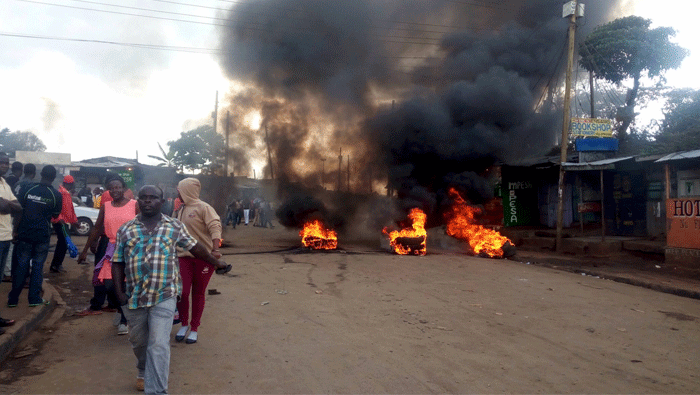
Nairobi: Opposition leader Raila Odinga urged Kenyans to boycott Thursday's repeat presidential election, saying he would lead a campaign of civil disobedience.
Odinga spoke shortly after the Supreme Court said it was unable to consider a last-minute appeal to delay the vote after five out of seven judges failed to turn up.
The Supreme Court ordered the repeat election after annulling an August 8 presidential vote, which Odinga lost, on procedural grounds. He is refusing to participate in Thursday's contest because he says the election commission has failed to implement reforms to prevent it being, once again, marred by irregularities.
"We advise Kenyans who value democracy and justice to hold vigil and prayers away from polling stations, or just stay at home," he told a cheering crowd in Nairobi's Uhuru Park, backing away from previous promise to call large-scale protests.
"Convince your friends, neighbours and everyone else not participate," he said in English. If they support the president, he cautioned: "do not insult or assault them. Instead, seek to open their eyes."
But several speakers who preceded him gave speeches in KiSwahili calling on opposition supporters not to allow people to vote. The repeat election was ordered by the Supreme Court on September 1 after judges nullified the results of the August 8 presidential contest on procedural grounds. The election commission had said Odinga lost to President Uhuru Kenyatta by 1.4 million votes.
With the Supreme Court unable to hear petitions to delay the vote, election officials said it would go ahead, regardless of Odinga's decision. Seeking to explain the Supreme Court's absences, Chief Justice David Maraga said one judge was unwell, another was abroad and another was unable to attend after her bodyguard was shot and wounded on Tuesday night. It was unclear why the others did not show up.
Minutes after Maraga's remarks on live television, hundreds of supporters took to the streets of Kisumu, Odinga's main stronghold. Riot police used teargas to disperse them. Two protesters received gunshot wounds, a Reuters witness said.
"If the government subverts the sovereign will of the people ... then people are entitled to rebel against this government," Kisumu governor Anyang Nyong'o, a hardline Odinga supporter, told reporters. Such comments seem certain to fuel fears of a major confrontation with security forces, already blamed for killing nearly 50 people in Kisumu and Nairobi slums after the cancelled August vote.
Months of political uncertainty have blunted growth in Kenya, East Africa's biggest economy and a key Western ally valued for its relative freedom and stability in a tumultuous region. Kenyatta is keen for the poll to proceed to cement his rule.
"Many wonder when or if ever all this politicking will end," he said in a televised speech on Wednesday evening. "I call to each and every one of us to turn out once again and vote." For some citizens, the instability has rekindled memories of large-scale ethnic violence that killed 1,200 people following a disputed election in 2007.
Shoppers crammed into Nairobi's upmarket Carrefour supermarket to stock up on food, said Jason Straziuso, who had to wait nearly two hours to pay for his groceries. "There was about 40 carts per register, everyone was jockeying for position trying to find the shortest line," he said.
"Every single cart was as full as it could be."
Single mother Marian Elema said she had paid double the usual bus fare for to take her five children to her home town Isiolo, in central Kenya, because she feared violence would break out in the port city of Mombasa where they live.
"I decided to travel home to escape possible clashes between opposition supporters and police," she told Reuters. "I am not here to vote but for the safety of my children."
In Kisumu's tallying centre, election officer John Ngutai sat huddled with a handful of other officials, waiting for missing election material and hundreds of absent colleagues. He said attacks by opposition supporters last week meant the election board had only managed to train 250 out of 1,300 staff needed to hold the election in his constituency.
"Our trainings were disrupted and officials attacked, so some people withdrew," he said. The head of the national election board, Wafula Chebukati, said the vote would proceed even if some polling stations were unable to open.
"In cases where there will be problems (delivering materials) ... the polling officer will have the right to inform us and polling can be suspended to another day."
Even if the election goes ahead, the opposition might still challenge the result in the Supreme Court. Judges said they were prepared to annul the re-run, and send the country of 45 million back to square one, if the election does not meet the required standards.
In a ruling early on Wednesday, High Court Judge George Odunga said some local election officials had been appointed in an irregular manner, but to withdraw them at the last minute would only make an already dire situation worse.
"For the elections to proceed in the absence of the said officers would in my view be a constitutional crisis of unimaginable magnitude. Simply put, it would be a recipe for chaos.”
However, he admitted that not dismissing them could form the grounds for legal challenges afterwards. Opposition lawyers seeking to challenge Thursday's vote might also cite the failure of the election board to hold elections in all parts of the country, if enough polling stations are unable to open. The constitution does not stipulate a minimum turnout, but says the election should be held at the same time in all parts of the country.